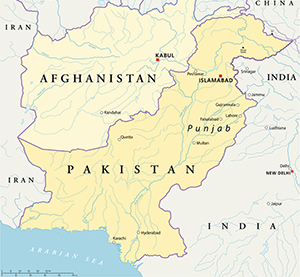ED-LINKS Pakistan
In recent years, one of the most pressing problems that plagued public sector education in Pakistan was the perpetuation of outdated methods of teaching and learning. The effects of a poor system of teaching and learning in Pakistan were students who left the system with no capacity for critical thinking, or much worse, were illiterate. Literacy rates in Pakistan were 53% overall and as low as 18% for females in rural areas. Furthermore, the quality of education provided by the public sector had been poor because of low levels of teacher competence, lack of classroom-based support for teachers, poor quality of textbooks and learning materials, lack of systems to assess student-learning outcomes, uneven supervision, insufficient resources for critical teaching and learning materials, and weak sector governance and management.
 Funded by USAID, the objective of the Links to Learning Program (ED-LINKS) (2007-2012) activity was to improve the quality and sustainability of teacher education and student performance in the targeted geographical areas of Sindh, Balochistan, Islamabad Capital Territory, and the Federally Administered Tribal Areas (FATA). Furthermore, ED-LINKS/Pakistan worked at all levels of Pakistan’s education system to improve professional development, student learning and the learning environment, and the capacity of the government to sustain quality education.
Funded by USAID, the objective of the Links to Learning Program (ED-LINKS) (2007-2012) activity was to improve the quality and sustainability of teacher education and student performance in the targeted geographical areas of Sindh, Balochistan, Islamabad Capital Territory, and the Federally Administered Tribal Areas (FATA). Furthermore, ED-LINKS/Pakistan worked at all levels of Pakistan’s education system to improve professional development, student learning and the learning environment, and the capacity of the government to sustain quality education.
The project partnered with Aga Khan University (who oversaw the implementation of ED-LINKS’ assessment work) and collaborated with the Ministry of Education to improve in-service teacher training and support. Interventions focused on increasing the capacity of the institutions and individuals responsible for supporting teachers and improving performance through in-service training. AIR worked with teachers and education officials to develop appropriate, quality instructional materials and learning tools. AIR also worked with Ministry of Education officials and education managers to build their skills, improve education policies and decision-making, and strengthen the data systems that inform their decisions. To improve student learning and to enhance the learning environment, AIR’s ED-LINKS team addressed: classroom-level factors, including the need for effective instruction in mathematics, science, computer science, and English; the need for appropriate, quality instructional materials and learning tools; and the need for creative and engaging learning opportunities to inspire children’s interest in these topics and to foster exceptional student achievement.


Through the ED-LINKS project, AIR:
- Trained nearly 10,000 teachers in standards-driven teaching and learning, low-cost and no-cost teaching materials, content knowledge, and classroom instruction, benefiting approximately 1,000,000 students.
- Developed a standards-based education framework with pacing guides, sample lesson plans, and formative and summative assessments to support teachers in the teaching of Pakistan’s National Curriculum.
- Established an Education Management Information System (EMIS) at the federal and provincial levels to provide timely and accurate education data to policy makers.
- Distributed 2,000 math and science kits to target schools to increase the understanding of, and interest in, these subjects for over 180,000 students.
ED-LINKS brought great promise to the education sector. ED-LINKS presented a well-conceived and innovative design for education change in Pakistan and laid out a bold vision for establishing links among governance reform, teacher performance, and student learning. ED-LINKS demonstrated some important ways forward in promoting systemic change. It contributed to governance reform, improved teacher and education manager capacity, and positively impacted middle and secondary learning environments.